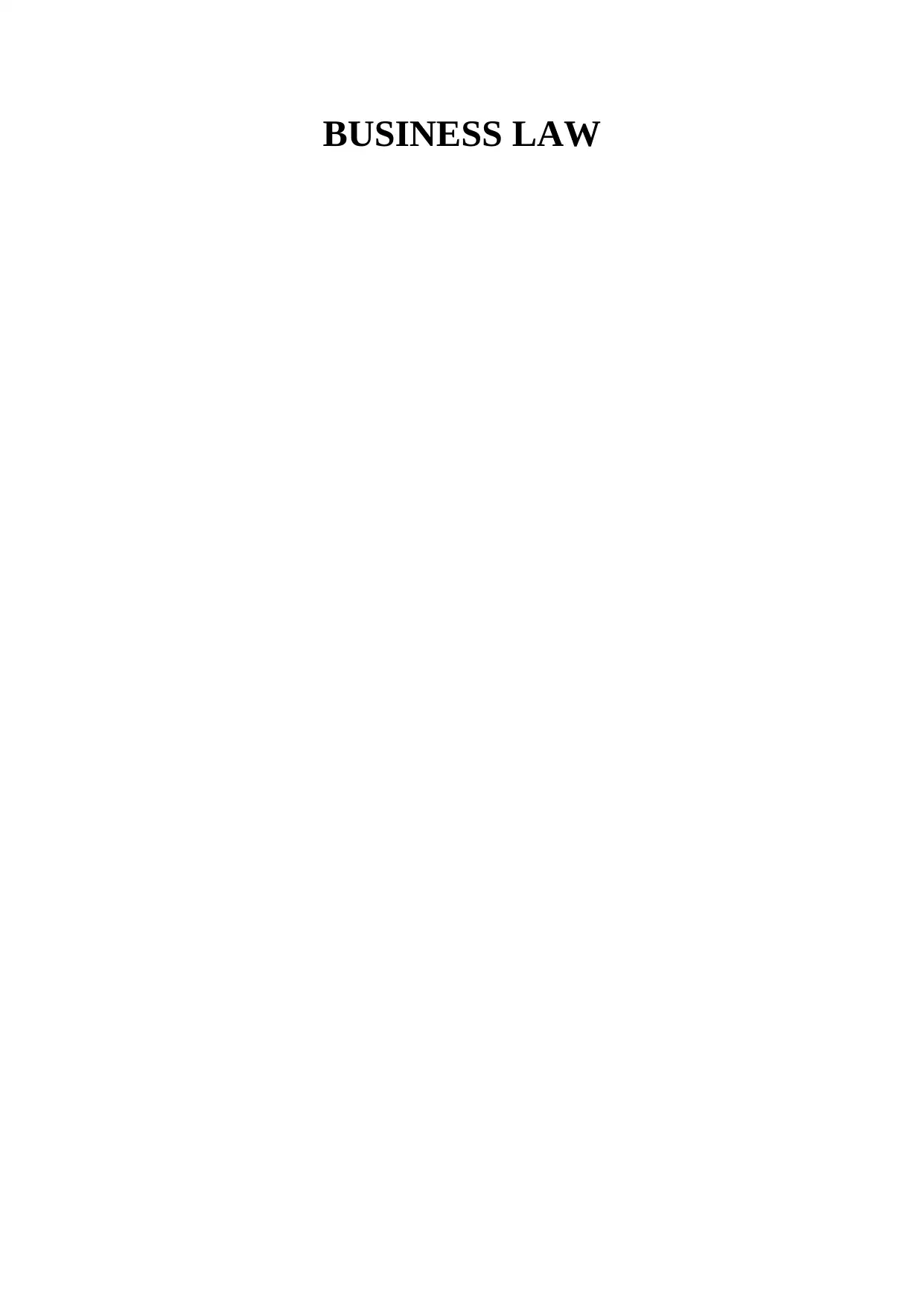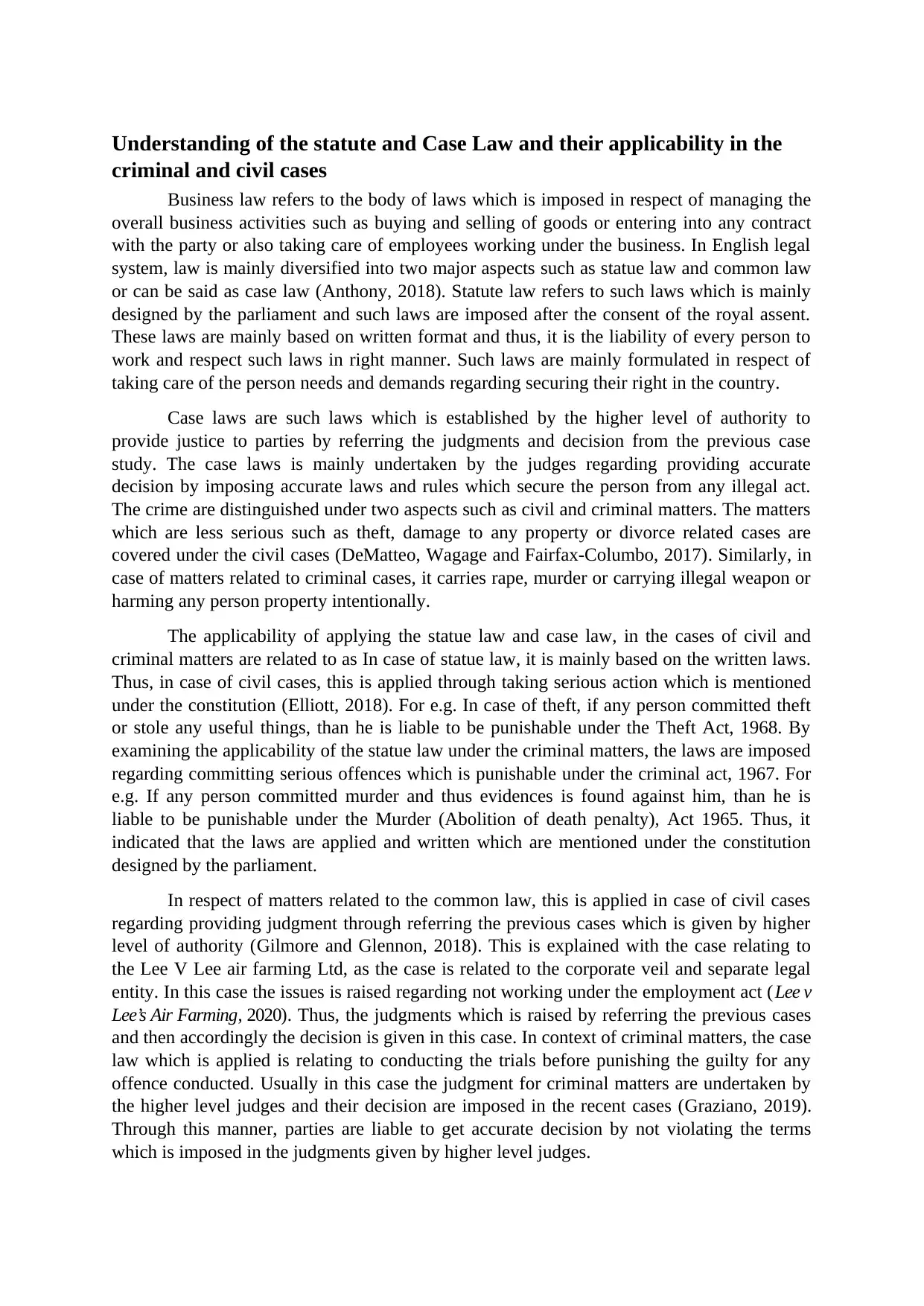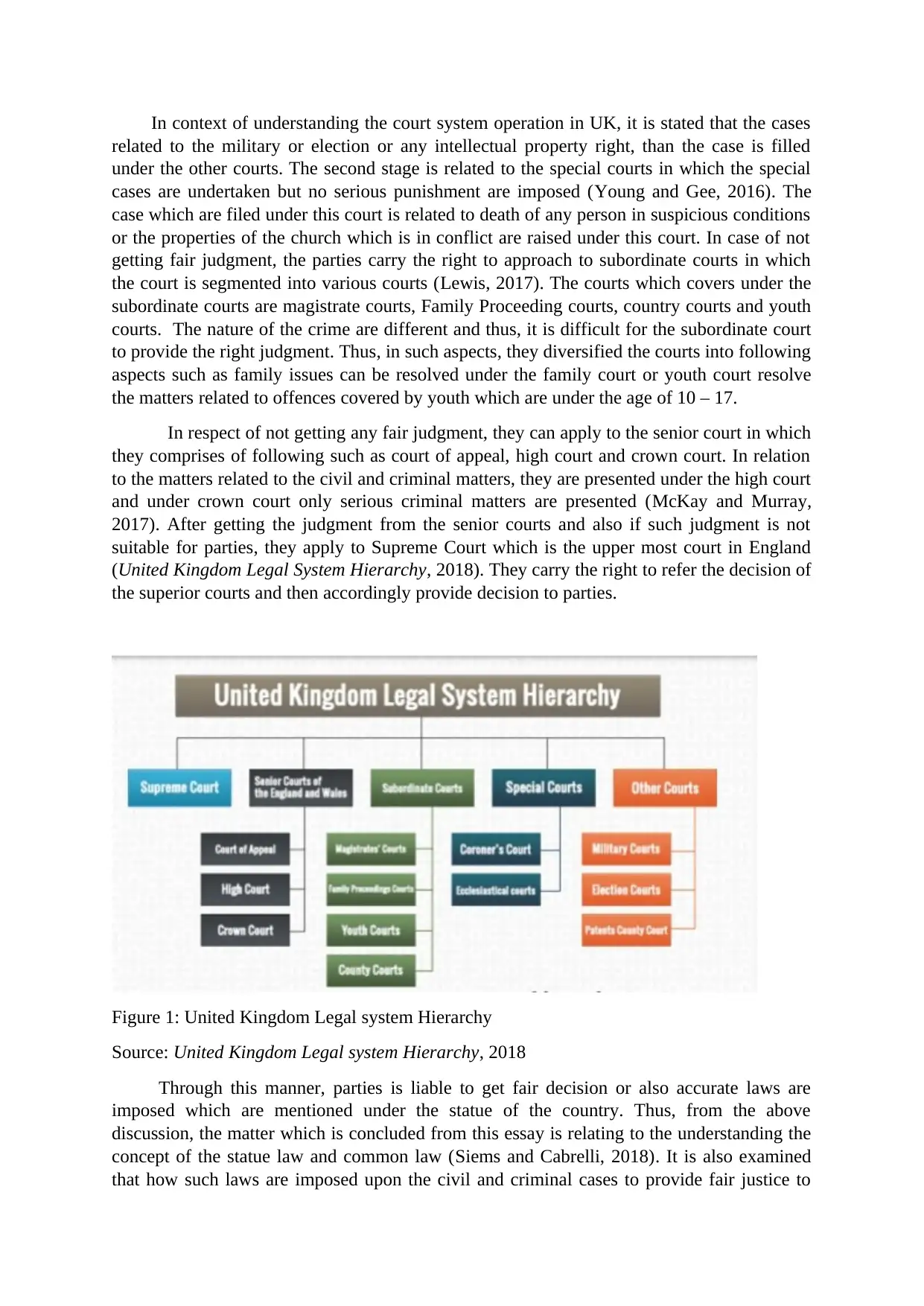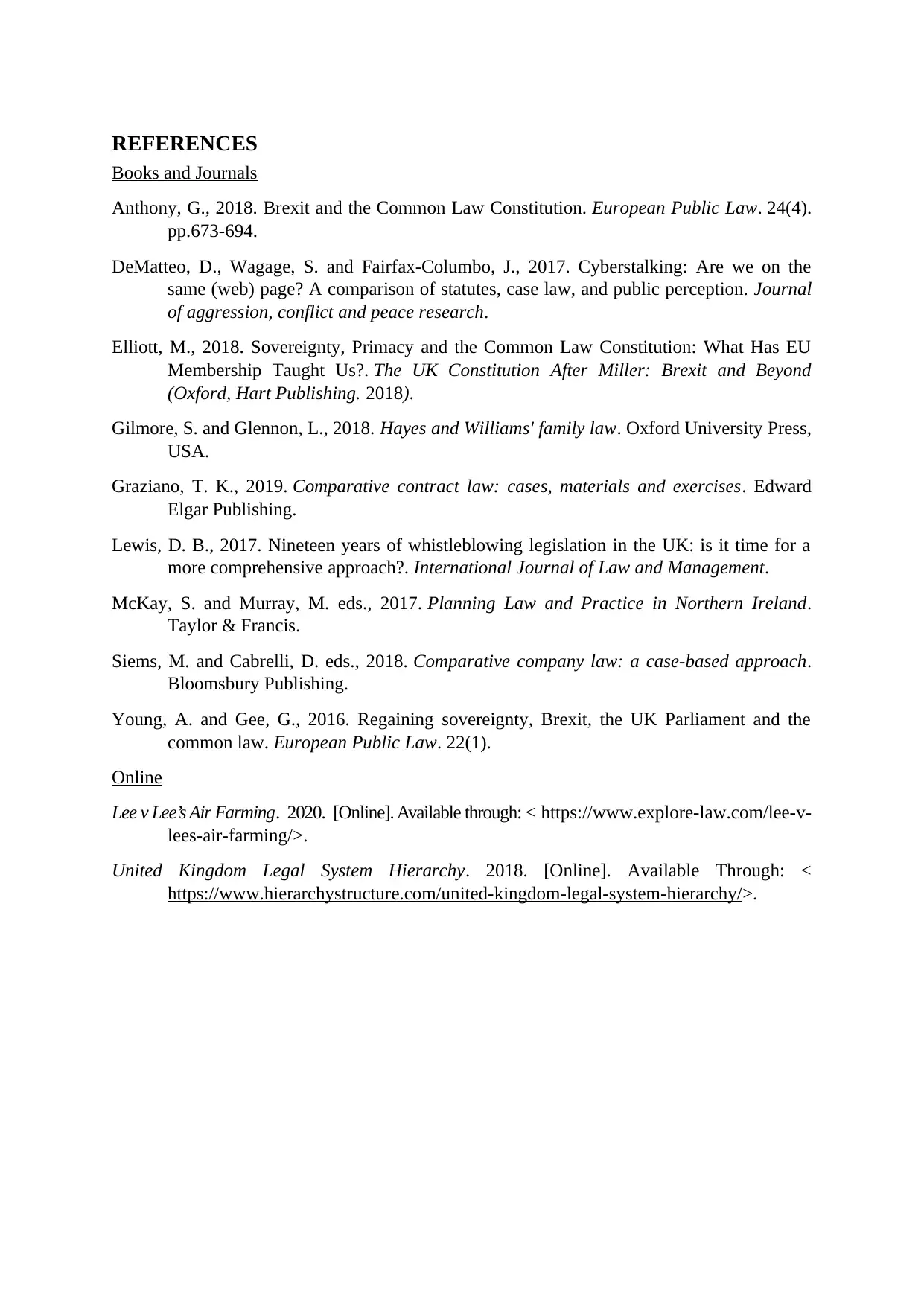Business Law - Assignment: Statute, Case Law, and Court Operation
VerifiedAdded on 2023/01/12
|6
|1533
|99
Essay
AI Summary
This essay delves into the core concepts of business law, differentiating between statute law and case law within the English legal system. It examines their distinct applications in both criminal and civil cases, providing illustrative examples such as the Theft Act 1968 and the Murder (Abolition of death penalty) Act 1965 to showcase statute law's impact, and the Lee v Lee's Air Farming Ltd case to demonstrate case law's influence. The essay further explores the UK court system's structure, outlining the hierarchy from subordinate courts like magistrate and county courts to senior courts including the Court of Appeal and Supreme Court, clarifying the jurisdiction of each. By analyzing the court system and legal principles, this essay provides a comprehensive understanding of the legal framework in the UK.

BUSINESS LAW
Paraphrase This Document
Need a fresh take? Get an instant paraphrase of this document with our AI Paraphraser

Contents
Understanding of the statute and Case Law and their applicability in the criminal and civil cases........3
REFERENCES......................................................................................................................................6
Understanding of the statute and Case Law and their applicability in the criminal and civil cases........3
REFERENCES......................................................................................................................................6

Understanding of the statute and Case Law and their applicability in the
criminal and civil cases
Business law refers to the body of laws which is imposed in respect of managing the
overall business activities such as buying and selling of goods or entering into any contract
with the party or also taking care of employees working under the business. In English legal
system, law is mainly diversified into two major aspects such as statue law and common law
or can be said as case law (Anthony, 2018). Statute law refers to such laws which is mainly
designed by the parliament and such laws are imposed after the consent of the royal assent.
These laws are mainly based on written format and thus, it is the liability of every person to
work and respect such laws in right manner. Such laws are mainly formulated in respect of
taking care of the person needs and demands regarding securing their right in the country.
Case laws are such laws which is established by the higher level of authority to
provide justice to parties by referring the judgments and decision from the previous case
study. The case laws is mainly undertaken by the judges regarding providing accurate
decision by imposing accurate laws and rules which secure the person from any illegal act.
The crime are distinguished under two aspects such as civil and criminal matters. The matters
which are less serious such as theft, damage to any property or divorce related cases are
covered under the civil cases (DeMatteo, Wagage and Fairfax-Columbo, 2017). Similarly, in
case of matters related to criminal cases, it carries rape, murder or carrying illegal weapon or
harming any person property intentionally.
The applicability of applying the statue law and case law, in the cases of civil and
criminal matters are related to as In case of statue law, it is mainly based on the written laws.
Thus, in case of civil cases, this is applied through taking serious action which is mentioned
under the constitution (Elliott, 2018). For e.g. In case of theft, if any person committed theft
or stole any useful things, than he is liable to be punishable under the Theft Act, 1968. By
examining the applicability of the statue law under the criminal matters, the laws are imposed
regarding committing serious offences which is punishable under the criminal act, 1967. For
e.g. If any person committed murder and thus evidences is found against him, than he is
liable to be punishable under the Murder (Abolition of death penalty), Act 1965. Thus, it
indicated that the laws are applied and written which are mentioned under the constitution
designed by the parliament.
In respect of matters related to the common law, this is applied in case of civil cases
regarding providing judgment through referring the previous cases which is given by higher
level of authority (Gilmore and Glennon, 2018). This is explained with the case relating to
the Lee V Lee air farming Ltd, as the case is related to the corporate veil and separate legal
entity. In this case the issues is raised regarding not working under the employment act (Lee v
Lee’s Air Farming, 2020). Thus, the judgments which is raised by referring the previous cases
and then accordingly the decision is given in this case. In context of criminal matters, the case
law which is applied is relating to conducting the trials before punishing the guilty for any
offence conducted. Usually in this case the judgment for criminal matters are undertaken by
the higher level judges and their decision are imposed in the recent cases (Graziano, 2019).
Through this manner, parties are liable to get accurate decision by not violating the terms
which is imposed in the judgments given by higher level judges.
criminal and civil cases
Business law refers to the body of laws which is imposed in respect of managing the
overall business activities such as buying and selling of goods or entering into any contract
with the party or also taking care of employees working under the business. In English legal
system, law is mainly diversified into two major aspects such as statue law and common law
or can be said as case law (Anthony, 2018). Statute law refers to such laws which is mainly
designed by the parliament and such laws are imposed after the consent of the royal assent.
These laws are mainly based on written format and thus, it is the liability of every person to
work and respect such laws in right manner. Such laws are mainly formulated in respect of
taking care of the person needs and demands regarding securing their right in the country.
Case laws are such laws which is established by the higher level of authority to
provide justice to parties by referring the judgments and decision from the previous case
study. The case laws is mainly undertaken by the judges regarding providing accurate
decision by imposing accurate laws and rules which secure the person from any illegal act.
The crime are distinguished under two aspects such as civil and criminal matters. The matters
which are less serious such as theft, damage to any property or divorce related cases are
covered under the civil cases (DeMatteo, Wagage and Fairfax-Columbo, 2017). Similarly, in
case of matters related to criminal cases, it carries rape, murder or carrying illegal weapon or
harming any person property intentionally.
The applicability of applying the statue law and case law, in the cases of civil and
criminal matters are related to as In case of statue law, it is mainly based on the written laws.
Thus, in case of civil cases, this is applied through taking serious action which is mentioned
under the constitution (Elliott, 2018). For e.g. In case of theft, if any person committed theft
or stole any useful things, than he is liable to be punishable under the Theft Act, 1968. By
examining the applicability of the statue law under the criminal matters, the laws are imposed
regarding committing serious offences which is punishable under the criminal act, 1967. For
e.g. If any person committed murder and thus evidences is found against him, than he is
liable to be punishable under the Murder (Abolition of death penalty), Act 1965. Thus, it
indicated that the laws are applied and written which are mentioned under the constitution
designed by the parliament.
In respect of matters related to the common law, this is applied in case of civil cases
regarding providing judgment through referring the previous cases which is given by higher
level of authority (Gilmore and Glennon, 2018). This is explained with the case relating to
the Lee V Lee air farming Ltd, as the case is related to the corporate veil and separate legal
entity. In this case the issues is raised regarding not working under the employment act (Lee v
Lee’s Air Farming, 2020). Thus, the judgments which is raised by referring the previous cases
and then accordingly the decision is given in this case. In context of criminal matters, the case
law which is applied is relating to conducting the trials before punishing the guilty for any
offence conducted. Usually in this case the judgment for criminal matters are undertaken by
the higher level judges and their decision are imposed in the recent cases (Graziano, 2019).
Through this manner, parties are liable to get accurate decision by not violating the terms
which is imposed in the judgments given by higher level judges.
⊘ This is a preview!⊘
Do you want full access?
Subscribe today to unlock all pages.

Trusted by 1+ million students worldwide

In context of understanding the court system operation in UK, it is stated that the cases
related to the military or election or any intellectual property right, than the case is filled
under the other courts. The second stage is related to the special courts in which the special
cases are undertaken but no serious punishment are imposed (Young and Gee, 2016). The
case which are filed under this court is related to death of any person in suspicious conditions
or the properties of the church which is in conflict are raised under this court. In case of not
getting fair judgment, the parties carry the right to approach to subordinate courts in which
the court is segmented into various courts (Lewis, 2017). The courts which covers under the
subordinate courts are magistrate courts, Family Proceeding courts, country courts and youth
courts. The nature of the crime are different and thus, it is difficult for the subordinate court
to provide the right judgment. Thus, in such aspects, they diversified the courts into following
aspects such as family issues can be resolved under the family court or youth court resolve
the matters related to offences covered by youth which are under the age of 10 – 17.
In respect of not getting any fair judgment, they can apply to the senior court in which
they comprises of following such as court of appeal, high court and crown court. In relation
to the matters related to the civil and criminal matters, they are presented under the high court
and under crown court only serious criminal matters are presented (McKay and Murray,
2017). After getting the judgment from the senior courts and also if such judgment is not
suitable for parties, they apply to Supreme Court which is the upper most court in England
(United Kingdom Legal System Hierarchy, 2018). They carry the right to refer the decision of
the superior courts and then accordingly provide decision to parties.
Figure 1: United Kingdom Legal system Hierarchy
Source: United Kingdom Legal system Hierarchy, 2018
Through this manner, parties is liable to get fair decision or also accurate laws are
imposed which are mentioned under the statue of the country. Thus, from the above
discussion, the matter which is concluded from this essay is relating to the understanding the
concept of the statue law and common law (Siems and Cabrelli, 2018). It is also examined
that how such laws are imposed upon the civil and criminal cases to provide fair justice to
related to the military or election or any intellectual property right, than the case is filled
under the other courts. The second stage is related to the special courts in which the special
cases are undertaken but no serious punishment are imposed (Young and Gee, 2016). The
case which are filed under this court is related to death of any person in suspicious conditions
or the properties of the church which is in conflict are raised under this court. In case of not
getting fair judgment, the parties carry the right to approach to subordinate courts in which
the court is segmented into various courts (Lewis, 2017). The courts which covers under the
subordinate courts are magistrate courts, Family Proceeding courts, country courts and youth
courts. The nature of the crime are different and thus, it is difficult for the subordinate court
to provide the right judgment. Thus, in such aspects, they diversified the courts into following
aspects such as family issues can be resolved under the family court or youth court resolve
the matters related to offences covered by youth which are under the age of 10 – 17.
In respect of not getting any fair judgment, they can apply to the senior court in which
they comprises of following such as court of appeal, high court and crown court. In relation
to the matters related to the civil and criminal matters, they are presented under the high court
and under crown court only serious criminal matters are presented (McKay and Murray,
2017). After getting the judgment from the senior courts and also if such judgment is not
suitable for parties, they apply to Supreme Court which is the upper most court in England
(United Kingdom Legal System Hierarchy, 2018). They carry the right to refer the decision of
the superior courts and then accordingly provide decision to parties.
Figure 1: United Kingdom Legal system Hierarchy
Source: United Kingdom Legal system Hierarchy, 2018
Through this manner, parties is liable to get fair decision or also accurate laws are
imposed which are mentioned under the statue of the country. Thus, from the above
discussion, the matter which is concluded from this essay is relating to the understanding the
concept of the statue law and common law (Siems and Cabrelli, 2018). It is also examined
that how such laws are imposed upon the civil and criminal cases to provide fair justice to
Paraphrase This Document
Need a fresh take? Get an instant paraphrase of this document with our AI Paraphraser

parties. The matters also discussed regarding understanding the court system of UK and how
the different cases are segment under the respective court to get fair decision.
the different cases are segment under the respective court to get fair decision.

REFERENCES
Books and Journals
Anthony, G., 2018. Brexit and the Common Law Constitution. European Public Law. 24(4).
pp.673-694.
DeMatteo, D., Wagage, S. and Fairfax-Columbo, J., 2017. Cyberstalking: Are we on the
same (web) page? A comparison of statutes, case law, and public perception. Journal
of aggression, conflict and peace research.
Elliott, M., 2018. Sovereignty, Primacy and the Common Law Constitution: What Has EU
Membership Taught Us?. The UK Constitution After Miller: Brexit and Beyond
(Oxford, Hart Publishing. 2018).
Gilmore, S. and Glennon, L., 2018. Hayes and Williams' family law. Oxford University Press,
USA.
Graziano, T. K., 2019. Comparative contract law: cases, materials and exercises. Edward
Elgar Publishing.
Lewis, D. B., 2017. Nineteen years of whistleblowing legislation in the UK: is it time for a
more comprehensive approach?. International Journal of Law and Management.
McKay, S. and Murray, M. eds., 2017. Planning Law and Practice in Northern Ireland.
Taylor & Francis.
Siems, M. and Cabrelli, D. eds., 2018. Comparative company law: a case-based approach.
Bloomsbury Publishing.
Young, A. and Gee, G., 2016. Regaining sovereignty, Brexit, the UK Parliament and the
common law. European Public Law. 22(1).
Online
Lee v Lee’s Air Farming. 2020. [Online]. Available through: < https://www.explore-law.com/lee-v-
lees-air-farming/>.
United Kingdom Legal System Hierarchy. 2018. [Online]. Available Through: <
https://www.hierarchystructure.com/united-kingdom-legal-system-hierarchy/>.
Books and Journals
Anthony, G., 2018. Brexit and the Common Law Constitution. European Public Law. 24(4).
pp.673-694.
DeMatteo, D., Wagage, S. and Fairfax-Columbo, J., 2017. Cyberstalking: Are we on the
same (web) page? A comparison of statutes, case law, and public perception. Journal
of aggression, conflict and peace research.
Elliott, M., 2018. Sovereignty, Primacy and the Common Law Constitution: What Has EU
Membership Taught Us?. The UK Constitution After Miller: Brexit and Beyond
(Oxford, Hart Publishing. 2018).
Gilmore, S. and Glennon, L., 2018. Hayes and Williams' family law. Oxford University Press,
USA.
Graziano, T. K., 2019. Comparative contract law: cases, materials and exercises. Edward
Elgar Publishing.
Lewis, D. B., 2017. Nineteen years of whistleblowing legislation in the UK: is it time for a
more comprehensive approach?. International Journal of Law and Management.
McKay, S. and Murray, M. eds., 2017. Planning Law and Practice in Northern Ireland.
Taylor & Francis.
Siems, M. and Cabrelli, D. eds., 2018. Comparative company law: a case-based approach.
Bloomsbury Publishing.
Young, A. and Gee, G., 2016. Regaining sovereignty, Brexit, the UK Parliament and the
common law. European Public Law. 22(1).
Online
Lee v Lee’s Air Farming. 2020. [Online]. Available through: < https://www.explore-law.com/lee-v-
lees-air-farming/>.
United Kingdom Legal System Hierarchy. 2018. [Online]. Available Through: <
https://www.hierarchystructure.com/united-kingdom-legal-system-hierarchy/>.
⊘ This is a preview!⊘
Do you want full access?
Subscribe today to unlock all pages.

Trusted by 1+ million students worldwide
1 out of 6
Related Documents
Your All-in-One AI-Powered Toolkit for Academic Success.
+13062052269
info@desklib.com
Available 24*7 on WhatsApp / Email
![[object Object]](/_next/static/media/star-bottom.7253800d.svg)
Unlock your academic potential
Copyright © 2020–2026 A2Z Services. All Rights Reserved. Developed and managed by ZUCOL.





